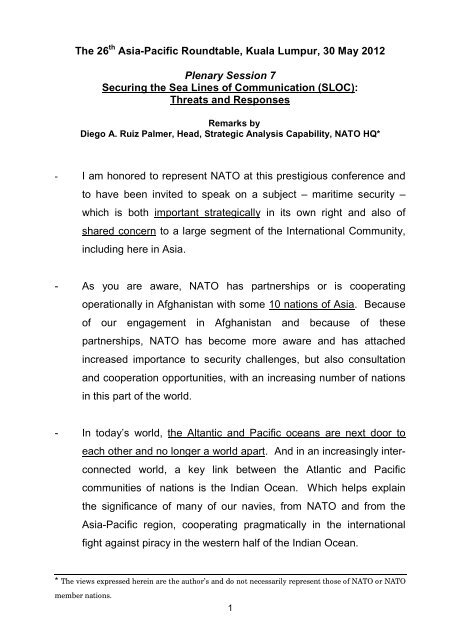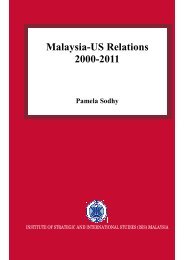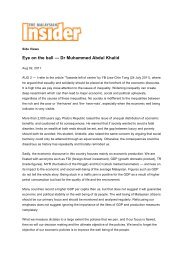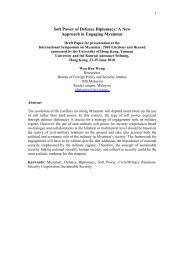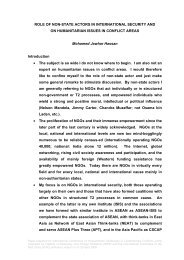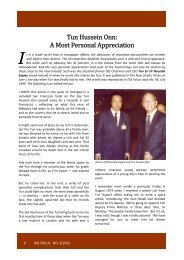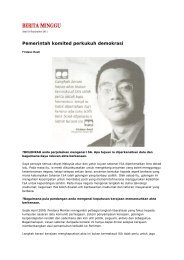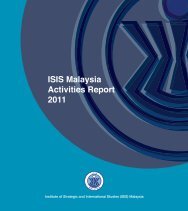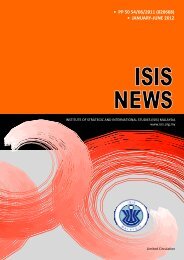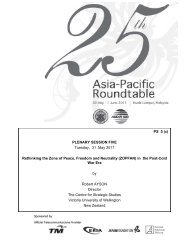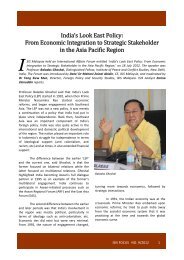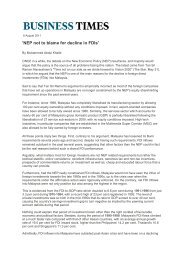Securing the Sea Lines of Communication (SLOC ... - ISIS Malaysia
Securing the Sea Lines of Communication (SLOC ... - ISIS Malaysia
Securing the Sea Lines of Communication (SLOC ... - ISIS Malaysia
Create successful ePaper yourself
Turn your PDF publications into a flip-book with our unique Google optimized e-Paper software.
The 26 th Asia-Pacific Roundtable, Kuala Lumpur, 30 May 2012<br />
Plenary Session 7<br />
<strong>Securing</strong> <strong>the</strong> <strong>Sea</strong> <strong>Lines</strong> <strong>of</strong> <strong>Communication</strong> (<strong>SLOC</strong>):<br />
Threats and Responses<br />
Remarks by<br />
Diego A. Ruiz Palmer, Head, Strategic Analysis Capability, NATO HQ*<br />
- I am honored to represent NATO at this prestigious conference and<br />
to have been invited to speak on a subject – maritime security –<br />
which is both important strategically in its own right and also <strong>of</strong><br />
shared concern to a large segment <strong>of</strong> <strong>the</strong> International Community,<br />
including here in Asia.<br />
- As you are aware, NATO has partnerships or is cooperating<br />
operationally in Afghanistan with some 10 nations <strong>of</strong> Asia. Because<br />
<strong>of</strong> our engagement in Afghanistan and because <strong>of</strong> <strong>the</strong>se<br />
partnerships, NATO has become more aware and has attached<br />
increased importance to security challenges, but also consultation<br />
and cooperation opportunities, with an increasing number <strong>of</strong> nations<br />
in this part <strong>of</strong> <strong>the</strong> world.<br />
- In today’s world, <strong>the</strong> Altantic and Pacific oceans are next door to<br />
each o<strong>the</strong>r and no longer a world apart. And in an increasingly interconnected<br />
world, a key link between <strong>the</strong> Atlantic and Pacific<br />
communities <strong>of</strong> nations is <strong>the</strong> Indian Ocean. Which helps explain<br />
<strong>the</strong> significance <strong>of</strong> many <strong>of</strong> our navies, from NATO and from <strong>the</strong><br />
Asia-Pacific region, cooperating pragmatically in <strong>the</strong> international<br />
fight against piracy in <strong>the</strong> western half <strong>of</strong> <strong>the</strong> Indian Ocean.<br />
* The views expressed herein are <strong>the</strong> author’s and do not necessarily represent those <strong>of</strong> NATO or NATO<br />
member nations.<br />
1
- I have prefaced my remarks on maritime security with <strong>the</strong>se wider<br />
political and strategic considerations, because NATO’s approach to<br />
maritime security must be seen in <strong>the</strong> broader context <strong>of</strong> what <strong>the</strong><br />
Alliance has designated in its new Strategic Concept, approved at<br />
<strong>the</strong> Lisbon Summit in November 2010, as one <strong>of</strong> its three core tasks<br />
– namely, its contribution to cooperative security.<br />
- Turning now to <strong>the</strong> topic <strong>of</strong> this panel, as everyone in <strong>the</strong> audience<br />
would be aware, NATO is, in many ways, a maritime alliance.<br />
- NATO is composed, to a large extent, <strong>of</strong> nations with long<br />
coastlines, centuries-old seafaring traditions, worldwide trading<br />
interests, and modern and powerful naval capabilities.<br />
- In many ways, NATO is a maritime hub, bringing toge<strong>the</strong>r naval<br />
forces and many o<strong>the</strong>r marine actors and agencies to ei<strong>the</strong>r<br />
cooperate operationally – and NATO’s Operation Ocean Shield in<br />
<strong>the</strong> Indian Ocean is an example <strong>of</strong> our NATO navies working<br />
toge<strong>the</strong>r side-by-side – or consult and exchange information and<br />
best practices, which we do through <strong>the</strong> holding <strong>of</strong> many maritimeoriented<br />
conferences and seminars – including one in Rome a<br />
month and a half ago and ano<strong>the</strong>r in Halifax a few days from now –<br />
as well as through <strong>the</strong> NATO Shipping Centre in Northwood, in <strong>the</strong><br />
United Kingdom.<br />
- At <strong>the</strong> same time, NATO, like o<strong>the</strong>rs, has not been exempt from<br />
what some observers call “sea blindness”, a sort <strong>of</strong> benign neglect <strong>of</strong><br />
all things maritime.<br />
2
- Yet, <strong>the</strong> prosperity <strong>of</strong> <strong>the</strong> world is fully dependent on <strong>the</strong> exercise<br />
and protection <strong>of</strong> <strong>the</strong> principle <strong>of</strong> freedom <strong>of</strong> navigation across <strong>the</strong><br />
seas and oceans <strong>of</strong> our planet.<br />
- Maybe our citizens do not realise it, probably many don’t, but some<br />
90% <strong>of</strong> all goods traded around <strong>the</strong> world go by sea.<br />
- Many operations and missions over <strong>the</strong> last two decades have been<br />
land-centric, and this may also help explain this “sea blindness”. But<br />
we should not lose sight that even in Afghanistan, carrier-based air<br />
support provided by allied aircraft-carriers sailing in <strong>the</strong> Arabian <strong>Sea</strong>,<br />
as well as logistic resupply coming ashore in Karachi, Pakistan,<br />
have been essential to any engagement on <strong>the</strong> ground. And, last<br />
year, <strong>the</strong> enforcement <strong>of</strong> <strong>the</strong> UN-mandated arms embargo in Libya,<br />
as well as <strong>the</strong> prosecution <strong>of</strong> <strong>the</strong> air campaign to protect civilians<br />
and civilian populated areas, was critically dependent on <strong>the</strong><br />
contribution <strong>of</strong> allied maritime forces operating in <strong>the</strong> Mediterranean<br />
<strong>Sea</strong>.<br />
- This is why, starting in 2008, NATO initiated what I can only call a<br />
“maritime awareness revolution”, which over <strong>the</strong> last three years has<br />
resulted in <strong>the</strong> approval by our highest decision-making body, <strong>the</strong><br />
North Atlantic Council, <strong>of</strong> an Alliance Maritime Strategy and a<br />
Maritime Security Operations Concept.<br />
- These are <strong>the</strong> highest-level maritime-oriented documents approved<br />
by <strong>the</strong> Alliance since <strong>the</strong> end <strong>of</strong> <strong>the</strong> Cold War more than 20 years<br />
ago.<br />
3
- This is why I have been talking <strong>of</strong> nothing less than a revolution in<br />
NATO’s awareness <strong>of</strong> <strong>the</strong> importance <strong>of</strong> <strong>the</strong> maritime dimension <strong>of</strong><br />
our shared security.<br />
- And <strong>the</strong> Alliance Maritime Strategy has been released as a publicly<br />
available document for all to see and read.<br />
- An important aspect <strong>of</strong> this Strategy is <strong>the</strong> new prominence given to<br />
maritime security and to NATO’s contribution to an international<br />
“comprehensive approach” to maritime security.<br />
- The concept <strong>of</strong> a “Comprehensive Approach” to crisis management<br />
developed by NATO applies as much at sea, as on land –<br />
particularly, its focus on consultation and information-sharing –<br />
although not necessarily in <strong>the</strong> same way.<br />
- NATO’s naval forces are now authorised and expected, in addition<br />
to <strong>the</strong>ir traditional military roles, to support law-enforcement efforts at<br />
sea, within <strong>the</strong> legal framework established by ei<strong>the</strong>r treaties or<br />
customary law.<br />
- Again, NATO’s Operation Ocean Shield in <strong>the</strong> Indian Ocean is an<br />
illustration <strong>of</strong> our contribution to <strong>the</strong> fight against unlawful behaviour<br />
at sea, in this case piracy.<br />
- Our UN-mandated maritime embargo operations along <strong>the</strong> coasts <strong>of</strong><br />
<strong>the</strong> Former Republic <strong>of</strong> Yugoslavia in <strong>the</strong> 1990s and <strong>of</strong> Libya last<br />
year -- Operations Sharp Guard and Unified Protector, respectively -<br />
are ano<strong>the</strong>r illustration.<br />
4
- Our naval forces also contribute to <strong>the</strong> deterrence or prevention <strong>of</strong><br />
o<strong>the</strong>r forms <strong>of</strong> unlawful behaviour at sea, such as that involved in<br />
conducting terrorist acts at sea and from <strong>the</strong> sea, or using <strong>the</strong> sea in<br />
support <strong>of</strong> <strong>the</strong> proliferation <strong>of</strong> weapons <strong>of</strong> mass destruction or <strong>the</strong>ir<br />
delivery means.<br />
- Here, NATO’s Operation Active Endeavour in <strong>the</strong> Mediterranean<br />
<strong>Sea</strong>, which is a maritime operation to deter and prevent terrorism,<br />
comes to mind.<br />
- Looking ahead, a main direction for NATO in <strong>the</strong> field <strong>of</strong> maritime<br />
security is <strong>the</strong> fur<strong>the</strong>r development <strong>of</strong> our partnerships with our<br />
Mediterranean Dialogue partners – countries that extend from<br />
Mauritania in <strong>the</strong> West to Jordan in <strong>the</strong> East – with our four partners<br />
in <strong>the</strong> Istanbul Cooperation Initiative – Bahrain, Kuweit, Qatar and<br />
<strong>the</strong> United Arab Emirates – and with our expanding number <strong>of</strong><br />
institutional or operational partners here in <strong>the</strong> Asia-Pacific region,<br />
many <strong>of</strong> whom are important actors in <strong>the</strong> maritime security field,<br />
including <strong>Malaysia</strong>.<br />
- We would like to see our mutual interaction on maritime security --<br />
from <strong>the</strong> exchange <strong>of</strong> information, experience and best practices, to<br />
practical, ship-to-ship cooperation at sea – expand and flourish.<br />
- NATO has several maritime-oriented institutions that naval <strong>of</strong>ficers<br />
and o<strong>the</strong>r maritime authorities might be interested in visiting, starting<br />
with our Allied Maritime Command headquarters and NATO<br />
Shipping Centre in Northwood.<br />
5
- Or, possibly, <strong>the</strong>se <strong>of</strong>ficers, or <strong>the</strong>ir civilian colleagues from o<strong>the</strong>r<br />
agencies, might be interested in attending some <strong>of</strong> <strong>the</strong> specialised<br />
courses given at <strong>the</strong> NATO Maritime Interdiction Operations Training<br />
Centre at Souda Bay, on <strong>the</strong> island <strong>of</strong> Crete, in Grece, or at one <strong>of</strong><br />
our three maritime-oriented Centres <strong>of</strong> Excellence, located in<br />
Norfolk, Virginia, in <strong>the</strong> United States, Ostende, in Belgium, and Kiel,<br />
in Germany.<br />
- And <strong>the</strong>re are also regular opportunities to ei<strong>the</strong>r observe or<br />
participate in NATO-led maritime exercises, which we hold in Europe<br />
about twice a year.<br />
- Last year, <strong>of</strong>f <strong>the</strong> eastern coast <strong>of</strong> Spain, NATO’s Bold Monarch<br />
2011 submarine rescue exercise brought toge<strong>the</strong>r not only several<br />
<strong>of</strong> NATO’s navies, but also vessels or observers from more than 20<br />
non-NATO nations around <strong>the</strong> world.<br />
- As we survey <strong>the</strong> evolving security environment, it is becoming<br />
increasingly clear that many modern security challenges will ei<strong>the</strong>r<br />
originate or manifest <strong>the</strong>mselves at sea. This is an ubiquitous set <strong>of</strong><br />
phenomena that can affect any nation, anywhere.<br />
- Risks extend from threats to international sea lines <strong>of</strong><br />
communication – for instance, piracy directed at merchant shipping<br />
in <strong>the</strong> Strait <strong>of</strong> Malacca or hypo<strong>the</strong>tical attacks on energy-related<br />
infrastructure at sea – to targeted terrorist acts against vessels or<br />
ships, such as those that took place a decade ago against <strong>the</strong> U.S.<br />
Navy destroyer USS Cole or <strong>the</strong> French tanker Limburg.<br />
6
- These risks are <strong>of</strong>ten difficult to anticipate, in tems <strong>of</strong> geography and<br />
timing, because <strong>of</strong> <strong>the</strong> vastness <strong>of</strong> sea areas and <strong>the</strong> scale <strong>of</strong> worldwide<br />
ship movements, to deter or to prevent.<br />
- Ocean, seas, straits and littoral areas <strong>of</strong>fer many opportunities for<br />
concealment and for <strong>the</strong> employment <strong>of</strong> “hit-and-run” tactics by<br />
pirates, criminal gangs and terrorists and <strong>the</strong>ir nation-state sponsors.<br />
- Small events at sea or in harbors can have disproportionally large<br />
consequences, starting with global media impact.<br />
- Many large cities <strong>the</strong> world over, many critical industrial,<br />
transportation and energy-related infrastructures are located along<br />
coastlines or in close proximity. They are vulnerable to interference,<br />
disruption or destruction originating at sea.<br />
- Climate change might also have consequences at sea and along <strong>the</strong><br />
littoral that are not yet fully understood.<br />
- While avoiding exaggerated alarmism, we need to reflect fur<strong>the</strong>r on<br />
<strong>the</strong> implications <strong>of</strong> a global society, where <strong>the</strong> connections and<br />
mutual dependency between prosperity and security on land and<br />
freedom <strong>of</strong> navigation and security at sea are expanding.<br />
- While <strong>the</strong> world’s oceans and seas have been, since <strong>the</strong> end <strong>of</strong> <strong>the</strong><br />
World War Two, mostly safe and secure, we cannot take it for<br />
granted that this will always be <strong>the</strong> case, everywhere and at all<br />
times.<br />
7
- Ensuring that <strong>the</strong> right <strong>of</strong> freedom <strong>of</strong> navigation is enjoyed and<br />
enforced may well require a greater commitment to international<br />
cooperation and a greater investment in <strong>the</strong> resources and<br />
capabilities that contribute to enhanced maritime security.<br />
- NATO is only one among several actors in this field and its area <strong>of</strong><br />
technical and operational competence is limited.<br />
- None<strong>the</strong>less, because <strong>of</strong> NATO’s membership and its partnerships,<br />
because <strong>of</strong> <strong>the</strong>ir global trade interests, and because <strong>of</strong> <strong>the</strong><br />
experience and expertise that NATO has in fusing and sharing<br />
information, in <strong>the</strong> development <strong>of</strong> doctrine and standard operating<br />
procedures, and in <strong>the</strong> planning and conduct <strong>of</strong> multinational<br />
operations, including disaster relief, <strong>the</strong> Alliance has an important<br />
contribution to make.<br />
- It is with this vision and this ambition in mind that I wish to conclude<br />
my remarks.<br />
- The opportunity is <strong>the</strong>re. We should not waste it.<br />
- Thank you for your attention.<br />
8


